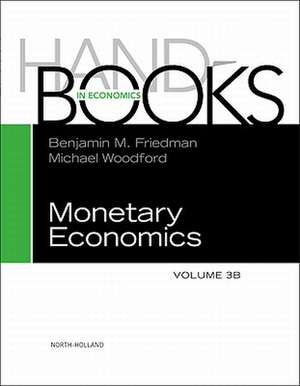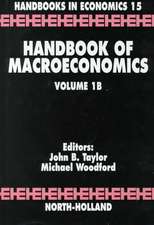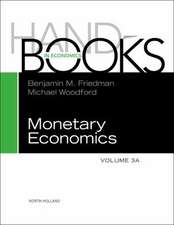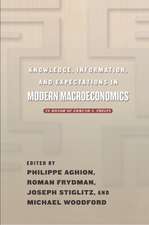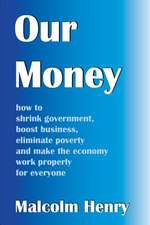Handbook of Monetary Economics: Handbooks in Economics, cartea 3B
Editat de Benjamin M. Friedman, Michael Woodforden Limba Engleză Hardback – 7 dec 2010
Top scholars summarize recent evidence on the roles of money in the economy, the effects of information, and the growing importance of nonbank financial institutions. Their investigations lead to questions about standard presumptions about the rationality of asset markets and renewed interest in fiscal-monetary connections. Stopping short of advocating conclusions about the ideal conduct of policy, the authors focus instead on analytical methods and the changing interactions among the ingredients and properties that inform monetary models. The influences between economic performance and monetary policy regimes can be both grand and muted, and this volume clarifies the present state of this continually evolving relationship.
- Presents extensive coverage of monetary policy theories with an eye toward questions raised by the recent financial crisis
- Explores the ingredients, properties, and implications of models that inform monetary policy
- Observes changes in the formulation of monetary policies over the last 25 years
Din seria Handbooks in Economics
- 27%
 Preț: 682.50 lei
Preț: 682.50 lei - 27%
 Preț: 699.97 lei
Preț: 699.97 lei - 27%
 Preț: 881.91 lei
Preț: 881.91 lei - 22%
 Preț: 710.43 lei
Preț: 710.43 lei - 30%
 Preț: 666.05 lei
Preț: 666.05 lei - 31%
 Preț: 571.68 lei
Preț: 571.68 lei - 28%
 Preț: 689.62 lei
Preț: 689.62 lei - 31%
 Preț: 637.09 lei
Preț: 637.09 lei - 9%
 Preț: 697.92 lei
Preț: 697.92 lei - 23%
 Preț: 629.07 lei
Preț: 629.07 lei - 9%
 Preț: 756.72 lei
Preț: 756.72 lei - 23%
 Preț: 729.06 lei
Preț: 729.06 lei - 9%
 Preț: 682.69 lei
Preț: 682.69 lei - 9%
 Preț: 578.03 lei
Preț: 578.03 lei - 9%
 Preț: 696.12 lei
Preț: 696.12 lei - 23%
 Preț: 604.89 lei
Preț: 604.89 lei - 9%
 Preț: 623.34 lei
Preț: 623.34 lei - 27%
 Preț: 863.50 lei
Preț: 863.50 lei - 27%
 Preț: 830.07 lei
Preț: 830.07 lei - 9%
 Preț: 674.31 lei
Preț: 674.31 lei - 9%
 Preț: 717.68 lei
Preț: 717.68 lei - 31%
 Preț: 711.21 lei
Preț: 711.21 lei - 29%
 Preț: 706.71 lei
Preț: 706.71 lei - 27%
 Preț: 901.70 lei
Preț: 901.70 lei - 23%
 Preț: 656.12 lei
Preț: 656.12 lei
Preț: 710.00 lei
Preț vechi: 780.22 lei
-9% Nou
Puncte Express: 1065
Preț estimativ în valută:
135.88€ • 141.33$ • 112.17£
135.88€ • 141.33$ • 112.17£
Carte tipărită la comandă
Livrare economică 07-21 aprilie
Preluare comenzi: 021 569.72.76
Specificații
ISBN-13: 9780444534545
ISBN-10: 0444534547
Pagini: 968
Dimensiuni: 191 x 235 x 41 mm
Greutate: 1.66 kg
Editura: ELSEVIER SCIENCE
Seria Handbooks in Economics
ISBN-10: 0444534547
Pagini: 968
Dimensiuni: 191 x 235 x 41 mm
Greutate: 1.66 kg
Editura: ELSEVIER SCIENCE
Seria Handbooks in Economics
Public țintă
Graduate students through professionals worldwide working in all fields of economics and finance, and particularly in subfields related to labor economics.Cuprins
Recenzii
"This, the companion volume provides the counterpoint to the Monetary Analysis writings in Volume 3A. Here the theme of macroeconomic engineering confronting politico-economic and socio-economic reality comes to the fore. The politics of monetary policy, inflation targeting, the clash between monetary and fiscal policy are all addressed. The question of robustness in macroeconomic policy making is considered. This volume provides a valuable source for those concerned with increasing our understanding of the links between theory and practice." --Martin Shubik, Yale University
"Monetary Economics has made great strides since the HANDBOOK OF MONETARY ECONOMICS, Volumes 1 and 2 was published. In Volumes 3A and 3B you will find surveys, written by leaders in their fields, of new work on foundations, the transmission mechanism, adaptive learning and expectation formation, optimal monetary policy, constraints on monetary policy, robustness in macroeconomics, monetary policy in practice, and much more, as well as applications to the latest crises. Every economist will want these volumes placed within easy reach on their bookshelf." --William A. Brock, University of Wisconsin, Madison
"Monetary Economics has made great strides since the HANDBOOK OF MONETARY ECONOMICS, Volumes 1 and 2 was published. In Volumes 3A and 3B you will find surveys, written by leaders in their fields, of new work on foundations, the transmission mechanism, adaptive learning and expectation formation, optimal monetary policy, constraints on monetary policy, robustness in macroeconomics, monetary policy in practice, and much more, as well as applications to the latest crises. Every economist will want these volumes placed within easy reach on their bookshelf." --William A. Brock, University of Wisconsin, Madison
